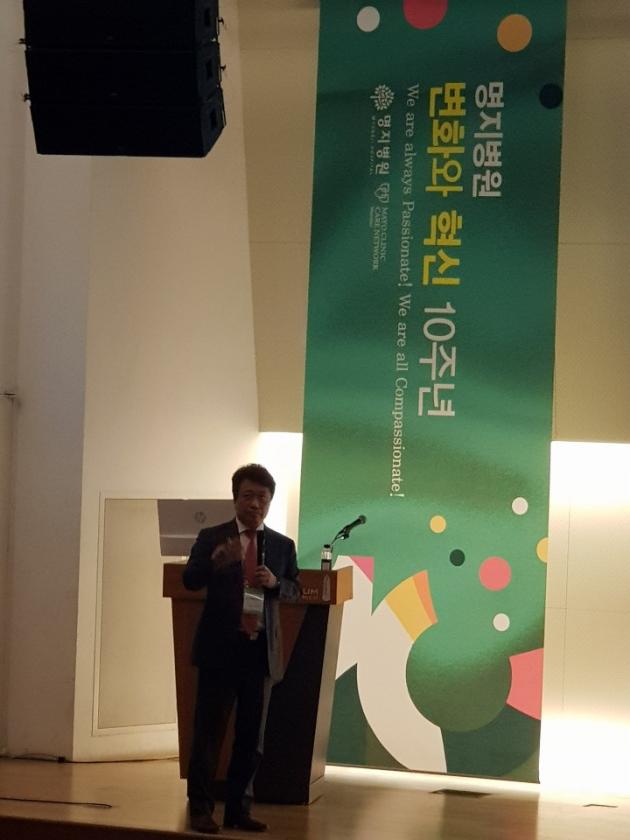Myongji Hospital has done all it could to change and innovate the hospital’s operation over the past decade, and contribute to improving the nation’s healthcare service, the hospital’s top manager said.

Chairman Lee Wang-jun made these and other points at a forum titled the "Futuristic strategy of healthcare business based on new technology and innovation Forum" on Tuesday. The hospital organized the event to celebrate its growth since Lee took over its management 10 years ago.
"Today is the 10th anniversary since I took the chairmanship of Myongji Hospital, and I have done my best to alter and renovate the institution to make it one of the most innovative hospitals in Korea over the period," Lee said. "To achieve such goals, the hospital set an annual milestone for the past 10 years and has not stopped until we achieved the goals."
Regarding the innovation, the hospital has established an office for healthcare innovation, which controls various centers for patient empathy, healthcare design, art, and health. The office also operates an institute of convergence to take a more direct approach to the Fourth Industrial Revolution technologies.
Thanks to hard work by the hospital staff under Lee’s leadership, Myongji Hospital has now grown to a medical institution that now has 1,600 beds, 2,700 employees, and 275 doctors.
The hospital has also recorded a turnover growth of about 25 percent every year since Lee took office.
Chairman Lee said that he plans to foster a hospital-based biotech enterprise that focuses on four areas -- precision medicine, cancer immunotherapy, Alzheimer's biomarker, and the gut microbiome.
"All four research areas are related to illnesses that have recently gained great international attention," Lee said. "Earlier this year, the four fields were mentioned by Bill Gates at the JP Morgan 2019 Healthcare Conference as areas in which his foundation, Bill and Melinda Gates Foundation, will invest."
The hospital has acquired or founded four companies to this end – Cancer Rop, MJ Cellbio, MJ Brain Bio and MJ Microbiome -- to focus on each area, he said.
Myongji Hospital and Cancer Rop have opened a new research institute, called New Horizon Cancer Institute, to boost clinical trials and fight cancer using precision medicine. Equipped with a smart lab and animal experiment rooms, the center is expected to play a pivotal role to carry out local and global clinical trials on various anticancer treatments and combination therapies using oncolytic viruses.
To target cancer immunotherapy, Lee has established MJ Cellbio in January this year. The company has licensed in a CAR-T source technology by concluding a technology transfer agreement with Korea University Industrial-Academic Cooperation Center (KUIACC).
Unlike existing CAR-T source technology based on conventional anthrax antigens, the modified anthrax antigen developed by Professor Lee Mi-kyung’s team at KUIACC minimizes the toxicity of existing immunotherapeutic agents and maximizes cancer-specific aggressiveness and efficacy.
"Through this technology, MJ Cellbio will go all out to develop CAR-T cells based on new antigens," Chairman Lee said. "MJ Brain Bio has recently started research on 350 patients to find a new Alzheimer's biomarker, and MJ Microbiome is still in the process of being established."
Touching on his plans for the hospital, Lee said that he sees the Korean medical field would undergo two significant changes shortly, and he will act accordingly to set up a plan to achieve the best results.
"The two changes that I believe will come shortly are the reunification of Korea and the change of healthcare service due to the rapidly changing environment resulting from the Fourth Industrial Revolution," he said. "I believe that the two developments will greatly change the medical field in Korea and will have lasting effects on our hospital."
During the conference, foreign participants also talked about the importance of innovations using their hospitals as an example.
Sangita Reddy, joint managing director of India's Apollo Healthcare Group's, said, “The Apollo Hospital Group was able to develop into a group with more than 10,000 beds in 60 hospitals within 35 years of its founding because it was active in introducing new technologies,"
Raffles Medical Group Medical Director Yang Ching Yu also said, "Singapore is looking at the innovative measure in response to the surge in medical expenses due to a low birthrate and aging population, and we believe the answer we are looking is a cost-effective healthcare system."

